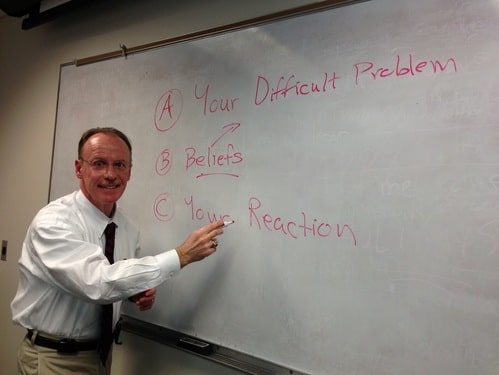Featured Interviews
In this interview, Dr. Matweychuk discusses the core principles of Rational Emotive Behavior Therapy. In it, he covers the three primary irrational attitudes that people use to disturb themselves. He discusses the self-empowering concept of unconditional self-acceptance. He also explains how Rational Emotive Behavior Therapy derives from Stoicism, the Hellenistic philosophy that dates back 2000 years, and is best represented by the philosophers Epictetus, Seneca, and Marcus Aurelius. Many find this interview interesting and useful for understanding the foundational concepts of Rational Emotive Behavior Therapy.

Part 1 of Interview – Questions for Dr. Matweychuk
1. Let’s start by you telling me a little bit about your educational background and professional development which led to your interest in Rational Emotive Behavior Therapy.
2. I understand Dr. Ellis was an immensely famous and charismatic psychologist. Some have gone as far to call him a genius. What was it like to be trained by him and to then work with him professionally as a colleague?
3. What is it about REBT that has caused you to stay with this psychotherapeutic approach over the 25 years of your career?
4. Let’s now discuss some of the core ideas of REBT in the context of how these apply to individuals and also to couples as they attempt to use REBT to better manage their problems of daily living and their relationship conflicts?
5. What are some of the unique ways you practice REBT? I see you use what are called Intermittent Reinforcement Email messages with your private patients. What are these and how do they help your patients?
6. I see you have numerous audio presentations on the application of various REBT topics. Why have you posted these audios on your website so that people can freely listen to them in the privacy of their homes, automobiles and on their smart phones?
7. Can REBT be helpful to those who have difficulty with self-discipline and indulgences of food, sex, drugs and alcohol?
8. Sadly today we are seeing an increase in prescription drug abuse. How does REBT help someone struggling with addiction?
Part 2 of Interview – Questions for Dr. Matweychuk
1. Do you find that REBT appeals to college students and young professionals? If so why is this?
2. Tell us about your future plans for REBT training in Philadelphia. What are you hoping to do in this regard?
3. Are there any further comments which you would like to make that would enable listeners of this audio to help them in their decision making when seeking professional treatment for their emotional, behavioral, or relationship problems? *Please note that Dr. Ellis died on July 24, 2007 at the age of 93. Dr. Matweychuk misspoke when he said Dr. Ellis died in 1993. Click here for the NY Times Obituary of Albert Ellis. Phone: 212-750-2826 to schedule an appointment.
Email: REBTDoctor@gmail.com



